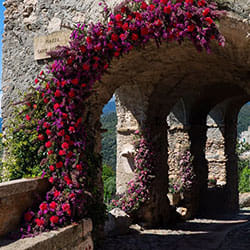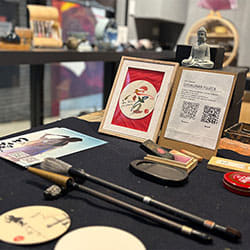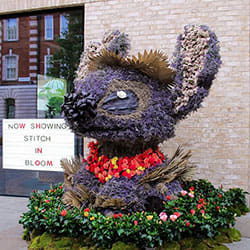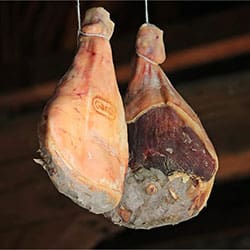It should be considered, in fact, that many of the British traditions were exported to various countries during the colonial era and then made their own paths.
Among these, during the night between the 24th and the 25th of December, the custom of leaving some kind of comfort food (milk and mince pie, above all here in England) for Santa Claus and the reindeers who help him carry gifts by pulling his magical sleigh.
Another very common English tradition is that of the Advent Calendar, which is to create a sort of calendar with windows that need to be opened one by one, day after day, until December 24th and which contains chocolates or other little surprises.

advent calendars in a bookstore
When we talk about the traditions of the Anglo-Saxon countries linked to the Christmas period, we cannot overlook one of the customs that are most common in the homes of every family in this period, namely the preparation of the characteristic Christmas tree.
I read that this is a custom that actually originated among populations of Nordic origin, especially of Germanic culture (the Anglo-Saxons tribes), linked to traditions even prior to Christianity, but which owes its introduction to private homes by Prince Albert of Saxony, husband of Queen Victoria, starting from the 19th century.
The Christmas tree is used as a symbol of life and rebirth.
The English tradition dictates that the Christmas tree should not stay in the house for more than twelve days and is usually removed on January 5th before 3 Kings’ Day.
There is a Christmas tree committee here in England which has even established how tall the tree should be but I don’t recall the exact measurements.
Another tradition of Anglo-Saxon countries is that of leaving a log burning in the fireplace on Christmas Eve that should burn as long as possible and of which an ember should be kept, as a sign of good luck, to light the fire the following Christmas.
For the Christmas holidays and the end of the year, tradition also has it that Christmas greetings cards are sent to friends, relatives and colleagues to wish them well, a tradition that does not seem to be outdated yet despite digital communication and that has become common among business partners and corporations too.
Another typical custom is that of Christmas carols that are sung from house to house, and for which, in exchange for sprigs of mistletoe and holly, children usually receive sweets and candies.

Xmas carollers singing together
It should be remembered that the exchange of mistletoe and holly, plants that symbolize immortality, has a very ancient origin that goes back to the ancient Druids, the Celtic priests, for the winter solstice celebrations.
Christmas in England is therefore the perfect mix among Celtic, Anglo-Saxon and Christian celebrations, the three main groups that colonized this land over the past thousands of years.
Another well-known custom is that of the Christmas Crackers.
These are cardboard tubes covered with coloured shiny paper and with the shape of a candy, inside which there is a small gift or candies.
They are used as nameplate and each guest at the Christmas table will find one on their plate.
Traditionally, before the Christmas lunch, one holds the Cracker they found on their plate with the right hand while the diners cross their arms and with the left hand one pulls one's neighbour's Cracker.
The opening of the Cracker takes place with a small pop that lets out the surprise that is inside.

Xmas Cracker
There are Anglo-Saxon traditions that obviously also affect food traditions: first of all the roast turkey, or the stuffed turkey, usually accompanied by blueberry sauce, and then the Christmas Pudding (inside which a chocolate coin is traditionally hidden to wish good luck to who will find it) or the Christmas Cake or Christmas biscuits.

santa’s hats - Christmas biscuits






























































